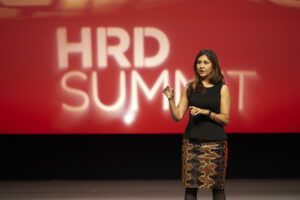Untapping neurodiverse talent pools: Interview with Dr Jill Miller
- 9 Min Read
The term ‘neurodiverse workplace’ is a relatively new term in HR, which is alarming given that recent CIPD research has shown that 10% of the UK population is neurodivergent, indicating that more needs to be done to support neurodiversity within the workplace.
- Author: Emily Sexton-Brown
- Date published: Feb 28, 2018
- Categories

For those who are still unaware, neurodiversity refers to the neurological differences between people. These alternative thinking styles could include dyspraxia, dyslexia, attention deficit hyperactivity disorder (ADHD), dyscalculia, autism, and Tourette’s syndrome.
 Richard Branson, one of the most famous entrepreneurs in the world, is dyslexic and has spoken about how having dyslexia has helped him to develop certain skills, as well as being passionate about ending the stigmatism around dyslexia. Although it’s great that people in the public eye are beginning to talk about neurodivergence, it’s still very much in its infancy when introducing it into the mainstream of recruitment processes and overall workplace culture.
Richard Branson, one of the most famous entrepreneurs in the world, is dyslexic and has spoken about how having dyslexia has helped him to develop certain skills, as well as being passionate about ending the stigmatism around dyslexia. Although it’s great that people in the public eye are beginning to talk about neurodivergence, it’s still very much in its infancy when introducing it into the mainstream of recruitment processes and overall workplace culture.
When we consider that talent sourcing is an ongoing issue for a number organisations, it’s hard to hide from the fact that there is an almost untapped talent pool being overlooked. Manpower reported that 40% of global employers are struggling to source the talent they need – it’s time we asked why?
Dr Jill Miller, diversity and inclusion adviser at the CIPD, spoke exclusively with HRD Connect to try and articulate exactly what employers should be aware of, and the overarching benefits of welcoming a more neurodiverse workforce into your organisation. Dr Jill also discusses a guide that the CIPD and Uptimize Neurodiversity have created for employers to ensure that they are mindful of neurodiversity and alternative thinking styles.
“Large organisations like Microsoft are beginning to talk about running dedicated neurodiversity programmes and the ways that it could benefit their organisation. We also need to consider that businesses are always on the lookout for the next source of talent – so why is this talent pool untapped?”
Why has neurodiversity started to be acknowledged by organisations?
It’s still only the minority of organisations that have considered neurodiversity. I think due to societal changes it’s becoming more apparent on employer’s radars; famous people such as Richard Branson have started to share their own personal experiences of their neurodivergence. This has started to frame neurodiversity in an entirely differently to the way it’s been presented in the past. Richard Branson talks about having dyslexia, how he chooses to see it as a gift, and how it’s helped him with the art of delegation. In the past we discussed how people needed to ‘adapt’ to or ‘fit into’ a workplace – it’s encouraging to see this attitude change.
We’re starting to identify the unique and specific strengths people have, and what they can bring to work. I’m starting to see a change in perception, and I’d like to see employers beginning to ask the question: “Why wouldn’t we want people within our organisation with those particular strengths?”

Large organisations like Microsoft are beginning to talk about running dedicated neurodiversity programmes, analysing the ways it can benefit the entire business. We also need to consider that businesses are always on the lookout for the next source of talent – so why is this talent pool untapped?
Do you think companies have suffered because they have not considered a neurodiverse workforce?
I think that competitors who are ahead of the curve will be quicker to hire neurodivergent individuals. I also think that companies run the risk of underusing the talent they already have, by not diversifying the workplace. An employee may not have a formal diagnosis or might not know that they are neurodivergent; therefore, we do need to be applying some of the principles from the guide universally across the organisation. We have also found that a lot of the adjustments being made from a neurodiversity perspective are good for everybody; for example, strong communication is vital so communications throughout the company should continuously be being improved. Another pointed difference is awareness of physical environments – this could be bright lights in the office causing over-stimulation and distracting employees.
“I think embracing neurodiversity really is a culture change.”
How would you advise managers who suspect someone of neurodivergence? And how should they make the workplace a better place for them to work?
Firstly, it’s up to the individual to share or disclose their own neurodivergence. I think in terms of the line manager, it comes down to good basic people management. Line managers need to be trained to treat each of their team members as individuals, and to understand their strengths and the challenges these individuals are facing because we’re all good at different things. Therefore, managers need to start looking at roles more flexibility – and feel empowered to do so. Flexible working is important, but flexible job design is key within neurodiversity. As good managers, we should be asking: “How do we enable someone to be the best (for example) programmer or engineer that they could possibly be? What can we adapt within their role to play to their strengths?”
As leaders, we need to think like this for every team member. I think embracing neurodiversity really is a culture change; it’s the way a company thinks about its employees as individuals. If we can create a culture where people feel they can talk about how they can perform better at work, it sets the tone, and you don’t feel like anyone will doubt your capability because you might find it hard to concentrate in an open-plan office. This could be due to neurodivergence or could be just as likely with a ‘neurotypical’ person – the point is, everyone will benefit from these changes.
How can these alternative thinking styles benefit the workplace?
The strengths people have will differ between individuals because no two people will be the same. There are some general strengths that we talk about within neurodiversity, but even these will differ. For example, if someone is autistic they could have the ability to spot patterns and trends. Autistic individuals also often think very logically, being able to assimilate and retain detailed information – I know that’s something I struggle to do. These individuals can be very innovative and have a predisposition to be creative. Those with ADHD are often good multitaskers and good at responding to change in high pressure situations, which is a great skill to have in today’s ever-changing working world.
But I guess one of the overarching messages that we’re conveying with the is that although we talk about the strengths involved – as managers we cannot stereotype. This can be done through training and creating more awareness. For instance, there may be an autistic individual who really struggles with eye contact, but that doesn’t mean that everyone with autism will struggle with eye contact.
“HR have got a key role in this. Firstly with their policies and practices, and secondly by making sure that they are not inadvertently either screening out or disadvantaging neurodivergent individuals.”
Do you think that more managers need to be trained around neurodivergence?
I think it can and should be integrated into general line management training. I think it starts with awareness. Focussing on line management training must be complemented with a general cultural awareness across the business. Running events such as lunch and learn sessions to fully introduce the concept of neurodiversity is a good idea. It’s of high importance that we acknowledge the fact that all our brains function differently, but we can work effectively together – it’s vital for collaboration.
Another area we need to focus on is colleague awareness, and not allowing one behaviour trait to allow others to assume someone’s overall capability. HR have got a key role in this. Firstly with their policies and practices, and secondly by making sure that they are not inadvertently either screening out or disadvantaging neurodivergent individuals.
I think another fundamental area is recruitment. We tend to make job descriptions overly long, with a huge wish list, but having these wish lists (which usually include generalist/transferable skills) isn’t always designed with neurodivergent individuals in mind, who have specific skills. We need to sit back when we design these job descriptions and ask, what do we really want out of this role? When we really think about it, this wish list might shorten considerably. By way of example, as a software programmer you’d need an in-depth knowledge of coding, but you wouldn’t necessarily need ‘excellent communication skills’. I think we are all guilty of using generic job descriptions, which could run the risk of people screening themselves out of the job, resulting in talented people not even applying because the job description hasn’t been written with these considerations in mind.
What would you like to see happen in an ideal world?
I’d like to see neurodiversity as a key area of diversity and inclusion within HR. I’d like to see the majority, rather than the minority, of employers to really see the benefits of alternative thinking styles for the overall business. I’d also really like to see workplace design being challenged – let’s think differently about the workplace and the way we manage people.
We must enable everyone to be their best by treating them as individuals and playing to their personal strengths.
What are your three pieces of advice to those in a position of leadership when considering a neurodiverse workforce?
- Spend time with team members – regular one-to-one catch ups with team members ensuring that you clearly understand their strengths.
- Think flexibility about job design – make a job play to your employee’s strengths.
- Gain an understanding of what neurodiversity is, and do not make assumptions and avoid stereotyping at all times.
About the guide devised by CIPD and Uptimize Neurodiveristy
This guide is for HR professionals and leaders across functions who want to learn more about neurodiversity, the benefits for their organisation, and how they can support neurodivergent people to be comfortable and successful at work.
The guide has two main aims: first, to raise awareness of neurodiversity in the workplace among employers; and second, to inspire more employers to action – to take steps to encourage neurodiverse job applicants, remove potential ‘friction points’ in the hiring process and to support their staff to achieve their potential.




